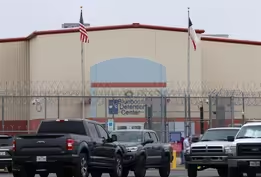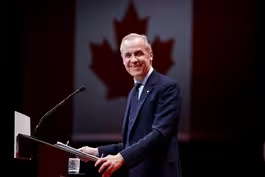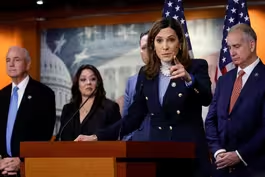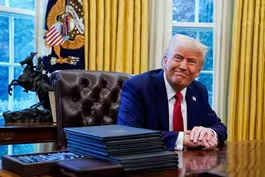
PBS CEO on the impact of cutting public media funding
Clip: 4/29/2025 | 8m 29sVideo has Closed Captions
PBS CEO weighs in on the potential impact of cutting public media funding
The Trump administration is expected to ask Congress to rescind more than $1 billion of funding from the Corporation for Public Broadcasting, the congressionally-created body through which NPR and PBS get federal funding, including for this program. The CPB is also suing the administration saying it illegally fired three members of the board. Amna Nawaz discussed more with PBS CEO Paula Kerger.
Problems playing video? | Closed Captioning Feedback
Problems playing video? | Closed Captioning Feedback
Major corporate funding for the PBS News Hour is provided by BDO, BNSF, Consumer Cellular, American Cruise Lines, and Raymond James. Funding for the PBS NewsHour Weekend is provided by...

PBS CEO on the impact of cutting public media funding
Clip: 4/29/2025 | 8m 29sVideo has Closed Captions
The Trump administration is expected to ask Congress to rescind more than $1 billion of funding from the Corporation for Public Broadcasting, the congressionally-created body through which NPR and PBS get federal funding, including for this program. The CPB is also suing the administration saying it illegally fired three members of the board. Amna Nawaz discussed more with PBS CEO Paula Kerger.
Problems playing video? | Closed Captioning Feedback
How to Watch PBS News Hour
PBS News Hour is available to stream on pbs.org and the free PBS App, available on iPhone, Apple TV, Android TV, Android smartphones, Amazon Fire TV, Amazon Fire Tablet, Roku, Samsung Smart TV, and Vizio.
Providing Support for PBS.org
Learn Moreabout PBS online sponsorshipAMNA NAWAZ: The Trump administration is expected to ask Congress to rescind more than a billion dollars of funding from the Corporation for Public Broadcasting, or CPB.
That's the congressionally created body through which NPR and PBS get federal funding, including for this program.
What's more, CPB sued the Trump administration in federal court today, saying the administration illegally fired three of its board members.
Those members, all nominated to their current terms by President Biden, were terminated in an e-mail on Monday.
The administration did not provide a reason for the firings.
But CPB said in a statement today that it's - - quote -- "not a government entity and its board members are not government officers subject to the president's authority."
I spoke earlier with Paula Kerger, the CEO of PBS.
Paula Kerger, welcome back to the "News Hour."
Thank you for being here.
PAULA KERGER, CEO, Public Broadcasting Service: Oh, thank you for having me.
I always enjoy spending time with you.
AMNA NAWAZ: So there has been some reporting I'm sure you have seen.
The administration made delay sending that request to rescind those funds to Congress while lawmakers are focused on the budget reconciliation process.
What is your sense of the effort to rescind those funds?
Is it a done deal at this point?
PAULA KERGER: Well, I mean, we're trying to understand exactly what's happening, and it seems to be very much a moving target Over the last few weeks, we have heard that a rescission package may be imminent, and then it hasn't come forward.
But this is probably the most difficult and serious threat in the time that I have been in public broadcasting.
This idea that funds that had already been put aside for public broadcasting would be taken away really has tremendous implications to our stations, because that's actually where the resources go.
Most of the money actually does not go to PBS or any national organization.
It goes directly to our stations to help them support their operations.
AMNA NAWAZ: So, as you and your team go, I know you're meeting with lawmakers, speaking to them to make the case.
What is the argument you're laying out to them and what are you hearing in response?
PAULA KERGER: Yes.
Well, I think the most important thing is that -- from our perspective is to make sure that legislators, as they're thinking about very difficult decisions about how to deal with our country's budget, understand where these dollars go.
It amounts to about $1.60 per person a year, just to put it into context.
And the money goes directly to fund the operations of our stations across the country.
When the Public Broadcasting Act was signed back in the late '60s, it was envisioned that public broadcasting would be a public-private partnership.
This is different than many other public broadcasters around the world, which are largely state-supported.
We are not.
About 15 percent in aggregate numbers -- that's 1-5 percent -- of the budget for public broadcasting comes from the federal government.
The rest of it comes from contributed money from viewers like you.
But the idea behind this public-private partnership is that there are many stations in communities that, without the federal support, the stations would not exist.
I have been to really extraordinary stations in small parts of the country in places like Granite Falls and in Cookeville, Tennessee, where you just see that the public media stations are such an important part of the fabric of those communities.
This is where people come together.
This is where politicians come in for town halls and for debates.
This is really a resource that the communities treasure and would not exist were there not federal dollars to help.
AMNA NAWAZ: You mentioned that you see this as a very serious effort in terms of the funds.
We should note there's been Republicans who have long sought to cut funding for public media.
So is there something different about this effort this time around?
PAULA KERGER: Yes.
I mean, here's the irony.
I mean, we have always received bipartisan support.
If you go back over the years, some of our biggest champions have been from both sides of the aisle.
I think this feels a little different because the country feels a little different.
I think the debates around our priorities in terms of what we fund have been different conversations than we have had in the past.
For us, as I look at this as -- and for many of our stations for whom this would be an existential crisis, I think it's very important that we make sure that, as those final decisions are made, the legislators understand the consequence of it, because the problem is, once these stations are gone, they're gone.
It's not that, well, maybe in a year we will bring them back or so forth once they're gone.
And you have to understand that in public broadcasting, we do a lot of work that people see.
We also do a lot of work that people do not see.
And one example is, our public broadcasting system really provides a lot of public service in terms of the use of the technology.
So we use our broadcast as the emergency backup for emergency alerts for the country.
And you need 100 percent coverage to make that happen.
So there are a lot of arguments that we make around the importance of it.
But I think the most is that this is really critical funding put in places that need it.
AMNA NAWAZ: There's also a couple of arguments we have heard from the administration as they look to cut those funds.
They argue that, by covering issues like race in America and gender issues, that public media is broadly engaging in what they call cultural indoctrination.
They also cite, among other things, the former NPR editor Uri Berliner's accusations that he said his network pushed progressive viewpoints.
That was at NPR, which is not PBS, to be clear.
But do you worry about that?
And what's your response to that accusation?
PAULA KERGER: Well, I think we work very hard, and I'm proud of this broadcast of its focus on bringing the most important stories forward.
I think that, when you look at news, it's important that we are here to be covering the important stories, whether they're international or national or local, and that's the work that our stations do.
You also have to remember that it's like 10 percent of the work that we do is news.
The rest of it is programming around science and history and so forth.
A big part of what we do is for kids.
We do eight hours of kids programming a day on most of our stations.
And when you consider the fact that 50 percent of children in this country do not attend formal pre-K, 50 percent, and the whole goal when "Sesame Street" was created, when Mister Rogers' first began looking into a camera and telling children that they are perfect just the way they are, that was really the beginning of an effort to try to make sure that kids that do not have access to a wide range of resources and possibilities would have that through their public television stations.
And that's what we do.
We're parents' first partners.
We're deeply involved in providing content for classrooms.
And we are there with a wide array of programming.
That's what is the role of public broadcasting.
AMNA NAWAZ: I know you have seen some of the latest Pew Research data as well in terms of how Americans are looking at this.
There are some 43 percent of Americans who say that NPR and PBS should continue to receive federal funding.
They want to see that continue.
Some 24 percent say Congress should remove that funding; 33 percent say that they're not sure.
So that means about 57 percent of Americans are either not sure or don't want to see federal funds continue for public media.
What does that say to you?
PAULA KERGER: Well, that's one survey.
I mean, we have done a series of surveys recently that show that 65 percent of Trump voters support funding for public broadcasting.
I think that, again, as I travel around and meet people in communities that are part of the fabric of the communities that we do serve, they tell us that what you do is tremendously important, and they especially love their local stations.
They treasure what they do, and they want to see them continue.
So I think you talked a few minutes ago about the conversations we have on the Hill.
I actually don't spend a lot of time on the Hill.
The people that do are those that are viewers of their local stations.
Those are the voices that I think legislators want to hear.
They want to hear from their constituents.
They want to know that, as they are wrestling with what to fund or not fund, that this is something of value.
And so, as we look forward over the next weeks, I know that many have called and said, what can we do?
I said, well, if you have an opinion, let your legislator know how you feel about support of your local stations.
AMNA NAWAZ: Paula Kerger, CEO of PBS, thank you so much for being here.
Really appreciate it.
PAULA KERGER: Thank you for having me with you.
Analyzing Trump's immigration agenda in his first 100 days
Video has Closed Captions
Clip: 4/29/2025 | 6m 6s | Analyzing Trump's actions on immigration during his first 100 days (6m 6s)
How Mark Carney led Canada's Liberal Party to election win
Video has Closed Captions
Clip: 4/29/2025 | 10m 4s | How Mark Carney led Canada's Liberal Party to an election win (10m 4s)
Salazar pushes citizenship path for undocumented migrants
Video has Closed Captions
Clip: 4/29/2025 | 9m 2s | GOP Rep. Salazar calls for pathway to citizenship for some undocumented immigrants (9m 2s)
Where Trump's approval rating stands after 100 days
Video has Closed Captions
Clip: 4/29/2025 | 5m 45s | Where Trump's approval rating stands after 100 days in office (5m 45s)
Why Trump softened some tariffs on automotive industry
Video has Closed Captions
Clip: 4/29/2025 | 5m 59s | Why Trump softened some of his tariffs on the automotive industry (5m 59s)
Providing Support for PBS.org
Learn Moreabout PBS online sponsorship
- News and Public Affairs

FRONTLINE is investigative journalism that questions, explains and changes our world.

- News and Public Affairs

Amanpour and Company features conversations with leaders and decision makers.












Support for PBS provided by:
Major corporate funding for the PBS News Hour is provided by BDO, BNSF, Consumer Cellular, American Cruise Lines, and Raymond James. Funding for the PBS NewsHour Weekend is provided by...




